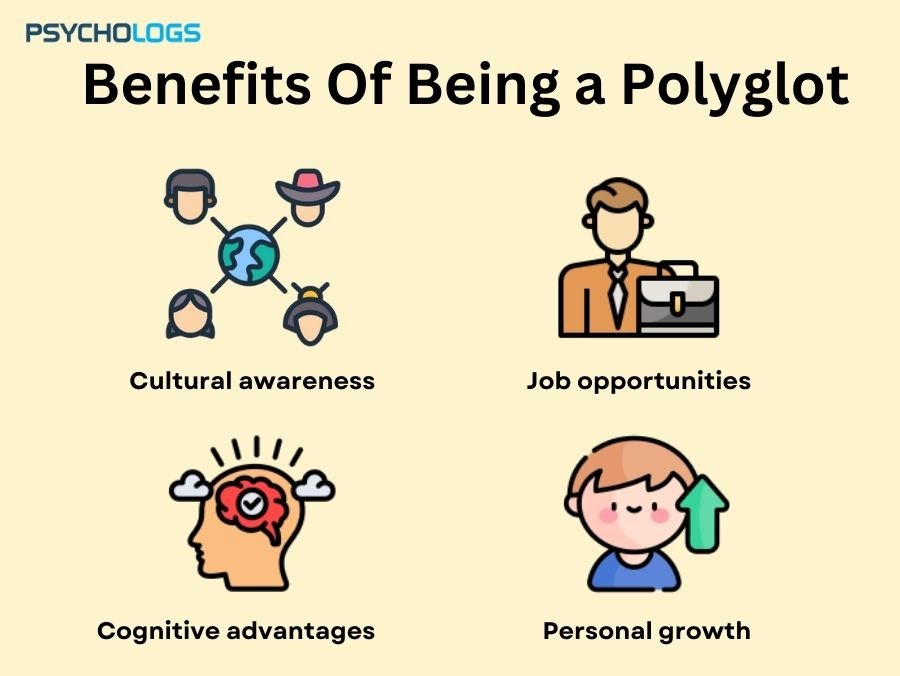We have picked up numerous languages, studied in various kinds of schools, and experienced a variety of cultures. Isn’t it funny that some of your peers are able to speak both your native tongue, English, and their native tongue? I was raised in Hyderabad, Telangana, and spoke Hindi (the official language), English (the language of the school), Telugu (my third language), Punjabi (my mother tongue and origins from north India), and Spanish (only for fun) which was far more than what my friends who were from that region, could speak. My family members, who also shifted from North, know more than three languages at least. But is it for anything more than picking up a new skill?
Benefits Of Being a Polyglot
A polyglot is someone who speaks in multiple languages. Modified from “Multilingualism” slightly to provide an extra point for acquiring another language for leisure purposes. Therefore, not just speaking with different people, it has multiple other benefits that go beyond on what it seems on the surface level, and some of those advantages are:
- Being able to know various cultures: getting access to understanding their traditions, literatures, local dialects.
- Job opportunities: translation, global diplomacy, and even access to more opportunities educationally.
- Cognitive advantages: research suggests that polyglots have advanced memory, problem-solving skills, and improves mental health.
- Personal growth: having great travel experiences, boost confidence, enriching personal identity.
Not only that, but being a polyglot creates a whole new world of opportunities for personal growth and connecting with the environment.

Effect On Cognitive Processes
No, it not just makes you a fun interactive person, but improves your executive functioning. Dr. Ellen Bialystok discovered that multilingual kids performed better on the Stroop test, which requires them to identify a word’s color when it is printed in a different color.
In a similar vein, it enhances problem-solving skills and increases multitasking proficiency. Pope Francis, for example, speaks four to five languages well. He seems to be able to manage the complexities of running a multinational organization in addition to connecting with a wide range of individuals.
According to an intriguing new study, those who were bilingual received an Alzheimer’s diagnosis 4.5 years later average, those who were monolingual. Additionally, they have greater working memory, which allows them to retain and retrieve grammar rules, vocabulary, and cultural context for multilingual people.
Let’s look at an example to help you better comprehend all of this. Amitabh Bachchan, a remarkable performer, is multilingual and has spoken Hindi, English, and Bengali in films like “Kabhi Alvida Na Kehana” and “Apu trilogy.” He speaks Punjabi and Urdu with ease as well. He is renowned for being a very gifted actor, having a remarkable memory for his scripts, and being a very intelligent person.
Effect On Identity
Polyglots have it all—from broadening their knowledge base to immersing themselves in other cultures. Speaking several languages well allows you to interact with people from other cultures and expands your perspective on the world and yourself. Their social abilities are improved, and they form a complex, multidimensional identity. Their sense of social identity has grown stronger. Their social network is more diverse, which boosts their confidence and sense of self-worth.
However, it’s equally critical to realize that this identity is applicable in professional settings in addition to social and personal ones. Employers frequently find them more appealing, particularly in globally integrated businesses. In job applications and interviews, polyglots can make a strong impression because of their ability to communicate with a wide range of partners and clients.
Interpretation, localization, and translation are among the responsibilities that polyglots can assume. These positions often call for in-depth linguistic and cultural understanding, enabling multilingual workers to apply their abilities in specialized domains. This also applies to applying to institutions overseas; German colleges actively seek out and favor applicants who speak German.
Implications Of Doing More Research In This Field
Polyglots frequently employ distinctive methods to pick up new languages. In order to improve the efficiency of language acquisition, research can identify efficient methods and strategies that can subsequently be included into educational curriculum, learning applications, and language instruction. Studying polyglots sheds light on how the brain remembers and processes several languages. Language education policy can be influenced by insights from polyglot research, which promotes more extensive language learning opportunities and early multilingualism to maximize cognitive and social benefits.
Takeaway
There are many advantages to being polyglot that go beyond simply being multilingual. It improves cognitive abilities including memory, multitasking, and problem-solving while offering a deeper comprehension of many cultures. This cultural understanding fosters personal development and increases self-assurance.
Professionally speaking, being multilingual can lead to more opportunities and increase one’s attractiveness to employers, particularly in globally integrated businesses. These revelations have the potential to enhance language policies and educational practices while highlighting the advantages of multilingualism from a young age. Due to AI, learning a new language has become easier and more accessible, hence what is stopping you?
References +
- Breen, D. (2024). Advantages of being a polyglot. Wiseward. https://gowiseward.com/blog/advantages-of-being-a-polyglot
- Dankova, N. (2021). Multilingual and multicultural people and their identity | ESF Connected. Esfconnected.org. https://esfconnected.org/2021/04/26/multilingual/#:~:text=Cultural%20or%20ethnic%20identity%20is
- Definition of Polyglot. (n.d.). Www.merriam-Webster.com. https://www.merriam-webster.com/dictionary/polyglot
- Kat. (n.d.). The benefits of being multilingual today ‹ EF GO Blog | EF Global Site (English). EF GO Blog | EF Global Site (English). https://www.ef.com/wwen/blog/language/benefits-of-being-multilingual/
- Klimova, B., Valis, M., & Kuca, K. (2017). Bilingualism as a strategy to delay the onset of Alzheimer’s disease. Clinical Interventions in Aging, Volume 12, 1731–1737. https://doi.org/10.2147/cia.s145397
- Mirchi. (2023, June 15). 7 Bollywood actors who speak multiple languages. Mirchi.in; Mirchi. https://mirchi.in/web-stories/7-bollywood-actors-who-speak-multiple-languages/photostory/101014887.cms
- Sobanski, B. (2016). Reflections on the Polyglot Self: Multilinguals Negotiating Identity. Canadian Ethnic Studies, 48(1), 161–173. https://doi.org/10.1353/ces.2016.0005













Leave feedback about this